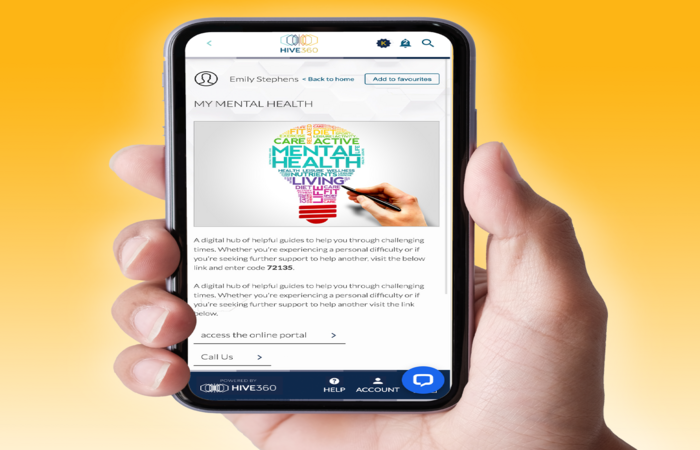
Health and wellbeing at work are just as important as salary for more than 80% of UK employees*, but what are the essential components of a wellbeing programme that employees truly want and need? David McCormack, CEO of HIVE360, investigates.
According to the findings of AON’s Global Wellbeing Survey (2021), two-thirds (60%) of SMEs say that providing health and wellbeing benefits has a high impact on the productivity of their company, whilst 22% rate having health and wellbeing benefits as critical to ensuring high productivity. Companies that improve wellbeing services by 4% see a 1% increase in profit, and a 1% boost to Employee Retention.
Another survey by the Joseph Rowntree Foundation, found that almost one-third of workers (approximately 8.2 million people) experience low work productivity due to financial concerns, and that 32% lose sleep and a quarter feel depressed because of the financial pressures.
One in four people in the UK experience mental health problems at some point in their lives, and work is cited as the biggest cause of stress and anxiety. The Health at Work Report examined the issues most undermining employee health, and confirms that mental health remains the biggest barrier to employee wellbeing. It reveals that 64% of employees have experienced burnout or fatigue, 25% have been diagnosed with clinical anxiety or depression, 72% have felt anxious, and 64% felt depressed.

Building blocks for employee wellbeing
These insights serve to reinforce the importance of strategies and policies that protect and nurture employee mental and physical wellbeing. The building blocks for all employee wellbeing strategies
include:
- The right investment for mental health: There can be no ‘one size fits all’ answer to employee mental health. Companies need to make the right investment in services to support staff, starting with training mental health first aiders and offering employee wellbeing programmes.Regular mental health check-ups and wellbeing sessions can boost staff health and reduce stress. According to recent figures, around 40% of employees wish to leave their role because of inadequate mental health support, so this is one benefit employers can’t afford to ignore.
- Support career wellbeing: A lack of purpose and direction at work can diminish employee wellbeing, so establish career wellbeing by providing Employee Training Solutions, outlining a clear job progression, and offering meaningful responsibilities.
- Create a positive community: Cultivating a more Inclusive and diverse workspace will take time, but it’s an effective way of making the workplace a supportive environment for employees. There is real value in making the workplace a comfortable, inviting place, encouraging a positive work culture that focuses on diversity and inclusivity. When staff are happy, the business benefits.
- Build openness: Work should be a safe space for open and honest discussions about employee wellbeing, so support this by providing managers with mental health resources, offering employees self-assessments and questionnaires, and encouraging co-workers to reach out if they need to talk.
- Emphasise job security: The cost of living crisis is having a huge impact on financial wellbeing, anxiety and overall mental health. It is essential employees feel valued for their work and that their job is safe. Free tools and resources on budgeting and household finances planning can also help ease employee worries, alongside staff recognition programmes, and clear career and promotion pathways.
- Work:Life balance: One of the best methods for supporting long-term mental health is to listen to what employees want from work. Support initiatives that improve their work-life balance, such as hybrid or flexible working practices, employee wellbeing days, or newer options like a 4-Day work week.
- Track results: Staff wellbeing and employee engagement work hand-in-hand. Measuring and tracking engagement can support wellbeing services, by identifying what works and what employees want, to enable modifications and enhancements.
- Employee benefits: Have an employee benefits package that offers relevant discounts and services that are in-tune with the challenges and worries facing employees each and every day, including the cost of living. So provide savings on everyday bills and expenses, such as collaborating with other businesses and retailers to offer staff exclusive discounts as part of their employee benefits.

Empowering businesses
HIVE360 enables businesses to improve employee engagement and wellbeing with its unique approach to payroll outsourcing and employee wellbeing and support. It is a specialist outsourced PAYE payroll, employee benefits and engagement company, which ensures full HMRC, RTI, GLAA and IR35 compliance, and provides expert, compliant and reliable PAYE payroll support and comprehensive employment administration for businesses, recruiters and recruitment agencies, their workforce and candidates.
HIVE360 provides its customisable employee benefits and wellbeing package via the unique Engage Employee Benefits app as standard to businesses that outsource payroll and employment administration to the company. Available in 120 languages, Engage includes My Health, My Money, My Discounts, and My Work features and has an average of 100,000-plus user sessions each month, with average levels of user engagement of around 85%
For more information, visit: https://www.hive360.com/payroll-pension-perks/
Sources:
*Gympass State of Work-Life Wellness Report 2022